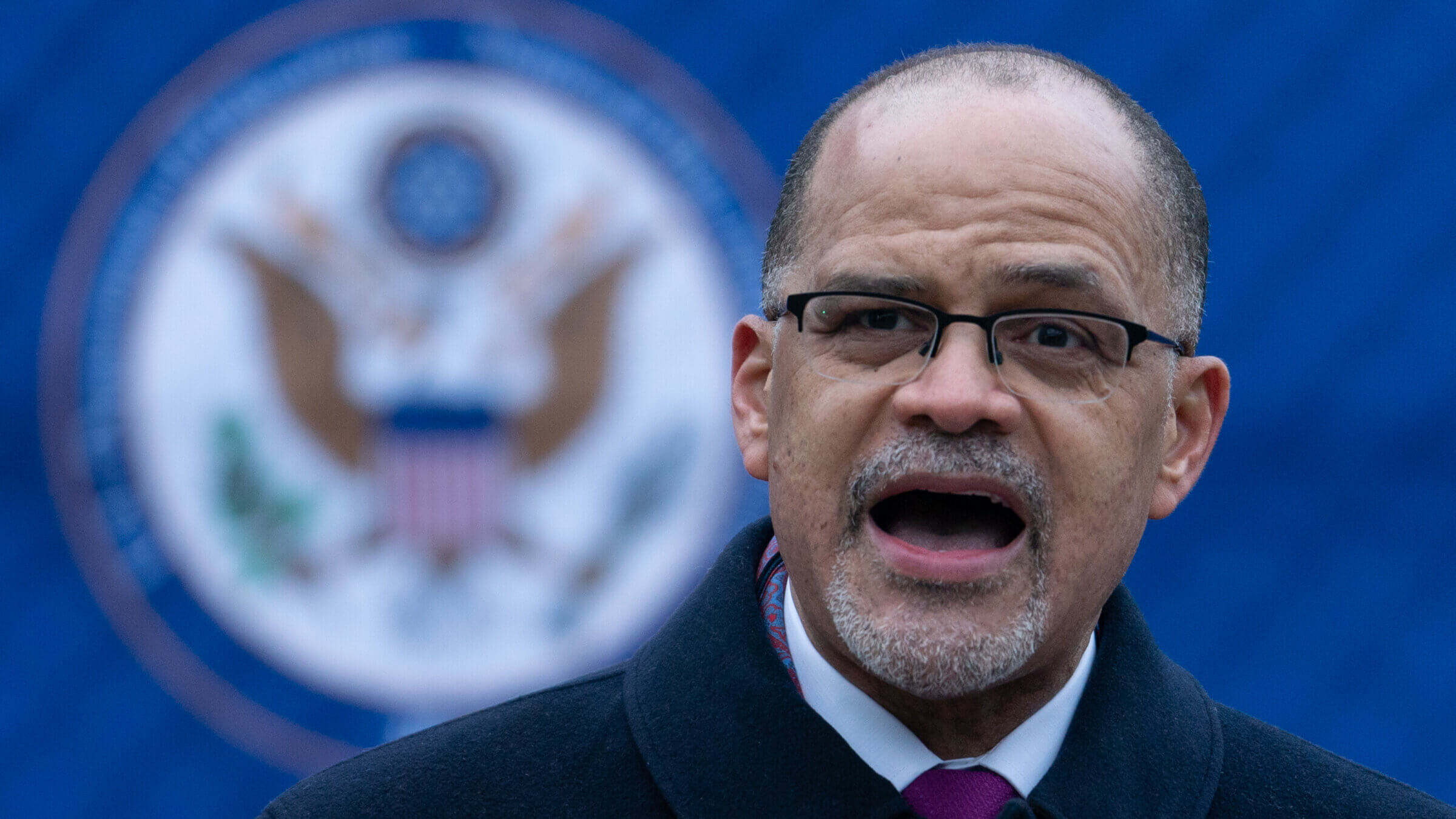New York’s schools chief defended students accused of antisemitism — now he has a plan to defeat it
‘When hate rears its head in our schools — be it Islamophobia, antisemitism, or any other form of bigotry — we will respond,’ said chancellor David Banks

David Banks, chancellor of the New York City Public Schools, speaks during a news conference in January 2022. Banks outlined a plan to combat antisemitism and Islamophobia Monday, responding to an uptick in discrimination against Jewish and Muslim students in recent months. Photo by Getty Images
David Banks, the chancellor of New York City Public Schools, outlined a plan to combat antisemitism and Islamophobia in the nation’s largest school district Monday amid a surge in discrimination and hate crimes against both Jews and Muslims since early October.
He said he would focus on boosting both education and safety.
“Fighting hate, promoting unity — that is the charge before us,” Banks said in remarks to a group of education and faith leaders at Tweed Courthouse in Manhattan.
While much of the attention around antisemitism in the U.S. has centered on colleges and universities, New York City schools are among 16 districts under investigation by the federal government for discrimination on the basis of “shared ancestry.” Most of the cases involve claims of antisemitism and Islamophobia.
The Jewish Students Union, a network of clubs at public schools around the country, said it has seen a “real surge” in reports of antisemitism since the Oct. 7 Hamas attack against Israel and amid the ongoing war in Gaza.
Other districts under investigation include those in Newark, San Francisco and Oakland, where more than 30 Jewish children have transferred out of over concerns about antisemitism in recent weeks.
A handful of students at a public high school in Yonkers, New York, just north of New York City, faced accusations of antisemitism after a basketball game against a Jewish day school after a student from the Yonkers team allegedly made antisemitic comments during the game. The district fired the coach and removed the player from the team.
(The Yonkers NAACP said last week that it had found no evidence of antisemitism at the game, and the fired coach told local media that he did not hear any slurs.)
Banks warns ‘not to malign our students’
Banks said that middle and high school principals would undergo training on “navigating difficult conversations” this spring, and receive additional guidance on how to discipline students who violate school rules.
“We cannot have schools where students feel like they can do whatever they want, without accountability for their actions,” he said.
He also announced plans to convene an interfaith advisory council to improve content about Jews and Muslims in the curriculum and said the district would prioritize investigations into antisemitism and Islamophobia above other forms of discrimination.
But Banks also sought to walk a fine line in his remarks between condemning antisemitism and Islamophobia — which he always grouped together, and placed along other types of discrimination — and protecting students accused of bigotry from outside criticism.
After hundreds of students at Hillcrest High School in Queens raucously demonstrated against a teacher who had posted in support of Israel on social media in November, Mayor Eric Adams called it a “vile show of antisemitism,” the New York Post claimed they were “radicalized” and the New York Police Department activated its counterterrorism unit.
Banks sought to defend the students.
“This notion that these kids are radicalized and antisemitic is the height of irresponsibility,” he said at a press conference following the incident. “I, for one, will not accept that at all.”
An unspecified number of students were suspended following the raucous protest, and the principal subsequently resigned. In his speech Monday, Banks said he found the student protest “deeply concerning,” but called for a thoughtful response.
“The way through this moment is not to malign our students, or to impose our own ideologies on them,” he said. “We must distinguish between truth and misinformation, and between disagreement and hate.”
A message from our CEO & publisher Rachel Fishman Feddersen
I hope you appreciated this article. Before you go, I’d like to ask you to please support the Forward’s award-winning, nonprofit journalism during this critical time.
We’ve set a goal to raise $260,000 by December 31. That’s an ambitious goal, but one that will give us the resources we need to invest in the high quality news, opinion, analysis and cultural coverage that isn’t available anywhere else.
If you feel inspired to make an impact, now is the time to give something back. Join us as a member at your most generous level.
— Rachel Fishman Feddersen, Publisher and CEO